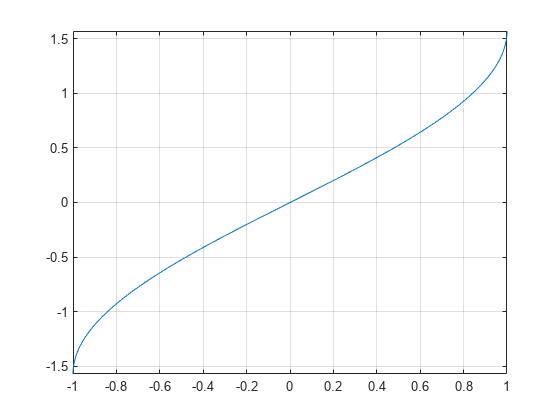asin
Symbolic inverse sine function
Syntax
Description
asin( returns the inverse sine
function (arcsine function) of X)X. All angles are in radians.
For real values of
Xin the interval[-1,1],asin(X)returns the values in the interval[-pi/2,pi/2].For real values of
Xoutside the interval[-1,1]and for complex values ofX,asin(X)returns complex values with the real parts in the interval[-pi/2,pi/2].
Examples
Inverse Sine Function for Numeric and Symbolic Arguments
Depending on its arguments, asin returns
floating-point or exact symbolic results.
Compute the inverse sine function for these numbers. Because these numbers are not
symbolic objects, asin returns floating-point results.
A = asin([-1, -1/3, -1/2, 1/4, 1/2, sqrt(3)/2, 1])
A =
-1.5708 -0.3398 -0.5236 0.2527 0.5236 1.0472 1.5708Compute the inverse sine function for the numbers converted to symbolic objects.
For many symbolic (exact) numbers, asin returns unresolved
symbolic calls.
symA = asin(sym([-1, -1/3, -1/2, 1/4, 1/2, sqrt(3)/2, 1]))
symA = [ -pi/2, -asin(1/3), -pi/6, asin(1/4), pi/6, pi/3, pi/2]
Use vpa to approximate symbolic results with floating-point
numbers:
vpa(symA)
ans = [ -1.5707963267948966192313216916398,... -0.33983690945412193709639251339176,... -0.52359877559829887307710723054658,... 0.25268025514207865348565743699371,... 0.52359877559829887307710723054658,... 1.0471975511965977461542144610932,... 1.5707963267948966192313216916398]
Plot Inverse Sine Function
Plot the inverse sine function on the interval from -1 to 1.
syms x fplot(asin(x),[-1 1]) grid on

Handle Expressions Containing Inverse Sine Function
Many functions, such as diff,
int, taylor, and
rewrite, can handle expressions containing
asin.
Find the first and second derivatives of the inverse sine function:
syms x diff(asin(x), x) diff(asin(x), x, x)
ans = 1/(1 - x^2)^(1/2) ans = x/(1 - x^2)^(3/2)
Find the indefinite integral of the inverse sine function:
int(asin(x), x)
ans = x*asin(x) + (1 - x^2)^(1/2)
Find the Taylor series expansion of asin(x):
taylor(asin(x), x)
ans = (3*x^5)/40 + x^3/6 + x
Rewrite the inverse sine function in terms of the natural logarithm:
rewrite(asin(x), 'log')
ans = -log((1 - x^2)^(1/2) + x*1i)*1i
Input Arguments
Version History
Introduced before R2006a